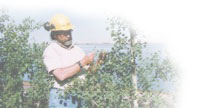 |
| site
design and hosting: pg advertising and design [sudbury] |
| Community-based Risk Assessment for the Sudbury Smelters - The Sudbury Soils Study
In recent years, several studies have shown there are areas in Sudbury with elevated metal levels in the soil. These areas are generally close to the historic smelting sites of Coniston, Falconbridge and Copper Cliff. Although these metals do occur naturally in all soils, the studies indicate that the higher amounts in surface soil (the top 5 cm. of soil) are the result of local mining, smelting and refining operations. In 2001, the Ontario Ministry of the Environment (MOE) released a report that identified that the concentrations of nickel, cobalt, copper and arsenic exceeded the generic MOE soil quality guidelines. Under Ontario legislation, this triggers the need for more detailed study. Therefore, the MOE made two recommendations: 1. That a more detailed soil study be undertaken to fill data gaps, and 2. That a human health and ecological risk assessment be undertaken. Both Inco Ltd. and Falconbridge Ltd. voluntarily accepted the recommendations and began working together to establish what is commonly referred to as “The Sudbury Soils Study”. The mining companies partnered with four other major stakeholders in Sudbury to oversee this rigorous study. The community partners are Inco Limited, Falconbridge Limited, the Ministry of the Environment, the Sudbury & District Health Unit, the City of Greater Sudbury, and Health Canada First Nations and Inuit Health Branch. These partners formed a Technical Committee to oversee the study. A Public Advisory Committee was also established to help address questions and concerns about the potential impact of elevated metal levels on the local environment and on human health. As people who live and work in Sudbury, the members of this partnership share these questions and concerns. A comprehensive soil sampling and analysis program was undertaken in 2001 by the MOE and the mining companies. Approximately 8,000 soil samples were collected from urban and remote areas and analyzed for 20 elements. These data form the basis for the study. Early in 2003, a consortium of consulting firms working together as the SARA (Sudbury Area Risk Assessment) Group was retained to undertake the risk assessment portion of the study. The main partners of the SARA Group are C. Wren & Associates Inc., Cantox Environmental Inc., RWDI, SGS Lakefield, and Goss Gilroy Inc. No Expected Immediate Risk to Human Health Both the Ontario Ministry of the Environment and the Sudbury District Medical Officer of Health believe that, based on previous studies of a similar nature in other Ontario communities, "there is no expected immediate risk to human health" due to metal levels in Sudbury soils. Today, the partners in the study agree a comprehensive human health risk assessment is a logical and necessary step to validate those beliefs. The Sudbury Soils Study - An Open, Public Process In addition to soil sampling, the study conducted an extensive survey of metal levels in local vegetable gardens, as well as commercial produce such as blueberries. This information will be used to provide site-specific exposure information in the human health risk assessment. A regional air quality monitoring network was also established to measure metal levels in the air people breathe. Additional sampling will include fish from local lakes, and a drinking water survey. It is expected that final results of the study will be made public in 2005. The Sudbury Soils Study is the most comprehensive assessment of its kind ever conducted in Ontario. The community will be kept informed of any possible risks these metals may pose to human health and/or the health of the environment. The study has already held three workshops and two public open houses, and released two community newsletters, as well as several news releases. In addition, there is a project website, and quarterly reports from the Independent Process Observer. |